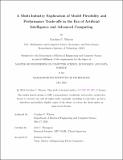A Multi-Industry Exploration of Model Flexibility and Performance Trade-offs in the Era of Artificial Intelligence and Advanced Computing
Author(s)
Warren, Caroline C.
DownloadThesis PDF (3.499Mb)
Advisor
Thompson, Neil C.
Terms of use
Metadata
Show full item recordAbstract
The evolution of advanced computing, driven by breakthroughs in artificial intelligence and large language models, presents significant opportunities for various industries. In this study, we analyze the trade-off between model performance and computational cost to understand industry-specific preferences and technology adoption dynamics. We construct a dataset of 150 published research papers that compare traditional machine learning, deep learning, and scientific computing models. Using both binary and relative comparison metrics, we assess improvements in performance and computational cost. We find that the healthcare industry prioritizes model accuracy over computational cost, with 40% of papers showing performance improvements but only 34.29% indicating cost efficiency. In contrast, the architecture industry demonstrates a significant focus on reducing computational costs, with 94.29% of papers reporting cost improvements but only 8.57% showing performance gains. The finance industry balances both aspects, with a preference for minimizing computational complexity, with 31.43% of papers showing performance improvements and 80% reporting cost reductions. We also find an exponential increase in publications relevant to this study over time, suggesting a rapidly evolving landscape in advanced computing.
Date issued
2024-05Department
Massachusetts Institute of Technology. Department of Electrical Engineering and Computer SciencePublisher
Massachusetts Institute of Technology